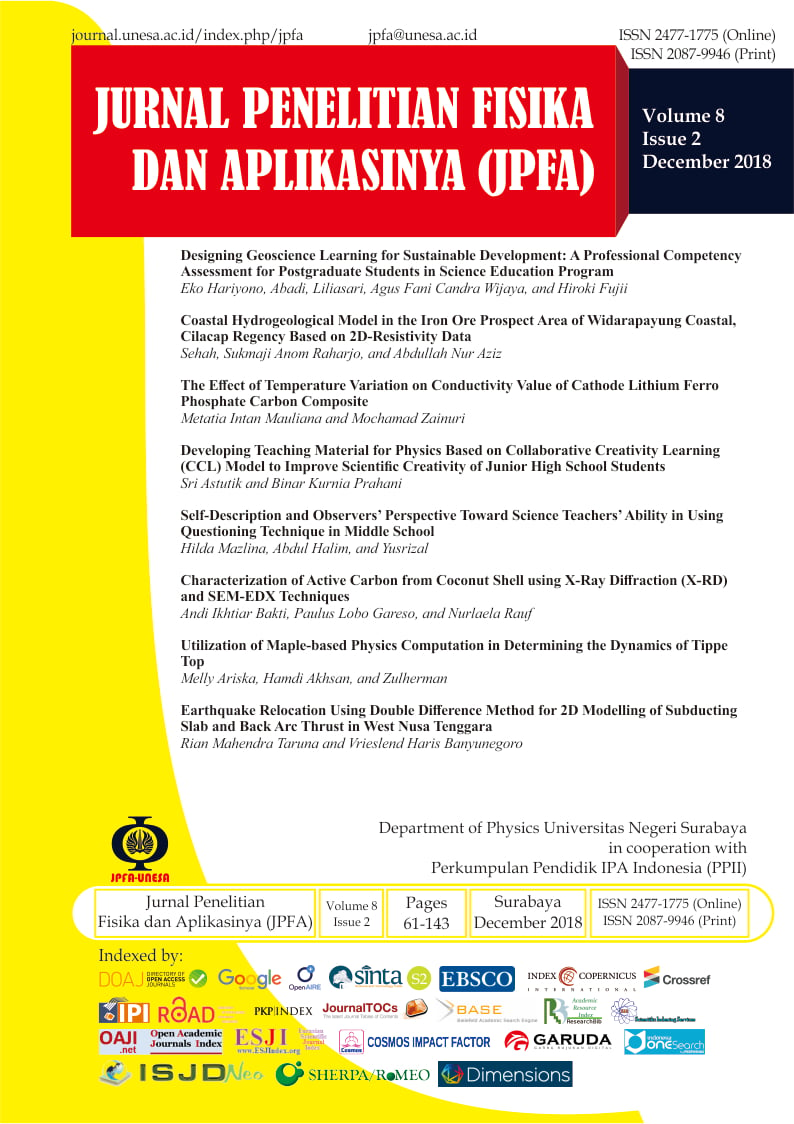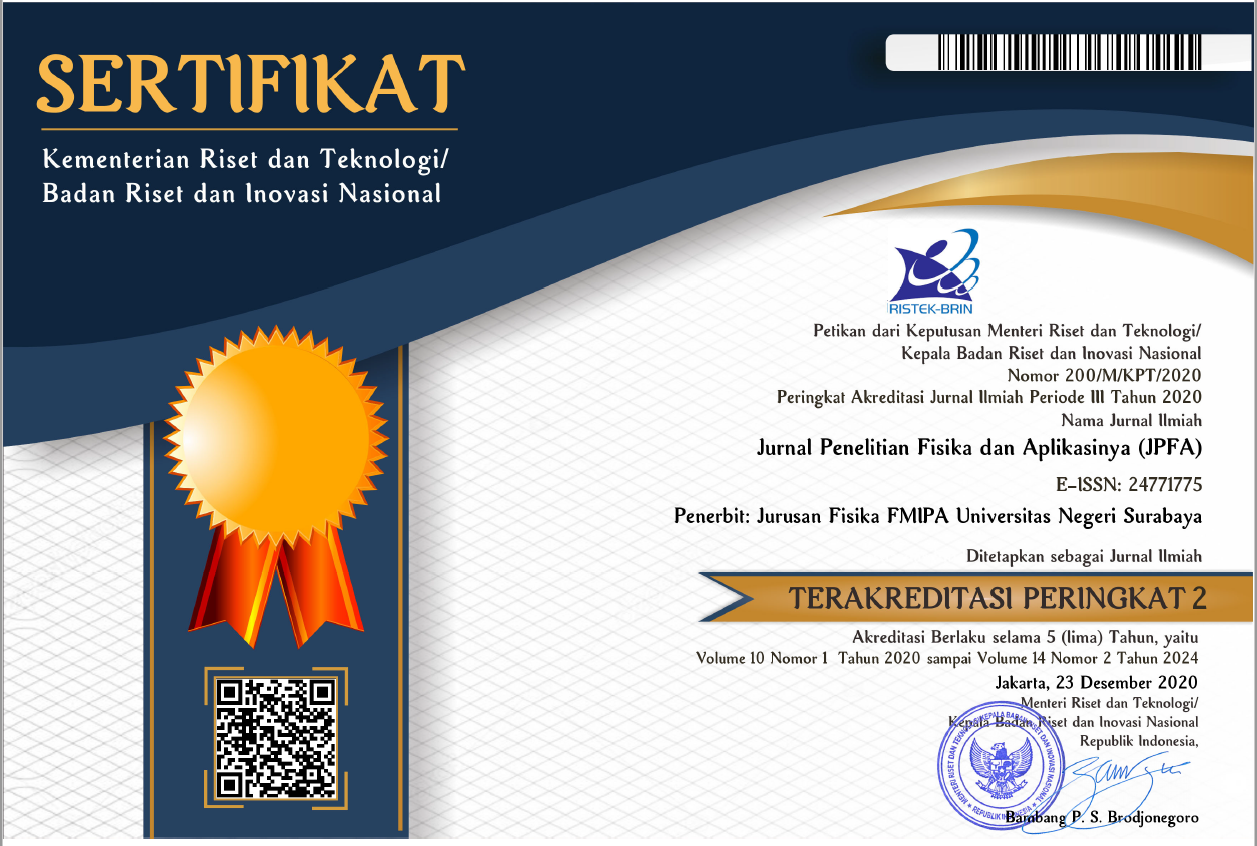Designing Geoscience Learning for Sustainable Development: A Professional Competency Assessment for Postgraduate Students in Science Education Program
DOI:
https://doi.org/10.26740/jpfa.v8n2.p61-70Keywords:
geoscience learning, sustainable development, professional competenciesAbstract
This research involved 19 postgraduate students majoring on Science Education at one university in Surabaya who were programming Earth and Space Sciences course. The objective of this research is to measure students ability in designing a lesson plan for sustainable education on environmental issues around volcanoes by integrating education for sustainable development (ESD) competence. Descriptive quantitative analysis was employed to assess the lesson plans developed by the students. In general, the results showed that the lesson plans were less contextual to support the improvement of decision-making abilities on the environmental issues, the emergence of environmental awareness among students, encouragement to the students to have sense of belonging to the environment, and fostering critical analysis of various environmental phenomena. The results suggest further efforts to improve professional competence of the postgraduate students in developing geoscience learning instruments, particularly related to integrate the ESD competence into lesson plans.
References
Dannenberg S and Grapentin T. Education for Sustainable Development - Learning for Transformation. The Example of Germany. Journal of Futures Studies. 2016; 20(3): 720. DOI: https://dx.doi.org/0.6531/JFS.2016.20(3).A7.
Klarin T. The Concept of Sustainable Development: From its Beginning to the Contemporary Issues. Zagreb International Review of Economics & Business. 2018; 21(1): 67-94. DOI: https://dx.doi.org/10.2478/zireb-2018-0005.
Gosselin D C, Manduca C, Bralower T J, and Mogk D. Transforming the Teaching of Geoscience and Sustainability. Eos, Transactions, American Geophysical Union. 2013; 94(25): 221-222. DOI: https://doi.org/10.1002/2013EO250002.
Pauw JB, Gericke N, Olsson D, and Berglund T. The Effectiveness of Education for Sustainability Development. Sustainability. 2015; 7(11): 15693-15717. DOI: https://doi.org/10.3390/su71115693.
Locke S, Libarkin J, and Chang CY. Geoscience Education and Global Devlopment. Journal of Geoscience Education. 2012; 60: 199-200. Available from: https://files.eric.ed.gov/fulltext/EJ1164210.pdf.
LaDue ND and Manning CB. Next Generation Science Standards: A Call to Action for the Geoscience Community. GSA Today. 2015; 25(2): 28-29. Available from: http://www.geosociety.org/gsatoday/archive/25/2/article/i1052-5173-25-2-28.htm.
Tanaka H. Education for Sustainability Development Education in Japan. Tokyo: ESDRC Rikkyo University; 2009.
Filho WL, Raath S, Lazzarini B, Vargas VR, de Souza L, Anholon R, Quelhas OLG, Haddad R, Klavins M, and Orlovic VL. The Role of Transformation in Learning and Education for Sustainability. Journal of Cleaner Production. 2018; 199: 286-295. DOI: https://doi.org/10.1016/j.jclepro.2018.07.017.
Awan AG. Relationship between Environment and Sustainable Economic Devopment: A Theoretical Approach to Environmental Problems. International Journal of Asian Social Science. 2013; 3(3): 741-761. Available from: http://aessweb.com/pdf-files/741-761.pdf.
Mora G. The Need for Geologist in Sustainable Development. GSA Today. 2013; 23(12): 36-37. Available from: http://www.geosociety.org/gsatoday/archive/23/12/article/i1052-5173-23-12-36.htm.
Kopnima H. Contesting ˜Environment Through the Lens of Sustainability: Examining Implications for Environmental Education (EE) and Education for Sustainable Development (ESD). Culture Unbond-Journal of Cultural Research. 2014; 6: 931-947. Available from: http://www.cultureunbound.ep.liu.se/v6/a51/cu14v6a51.pdf .
Kraft KJ, Srogi L, Husman J, Semken S, and Fuhrman M. Engaging Students to Learn Through the Affective Domain: A new Framework for Teaching in the Geoscience. Journal of Geoscience Education. 2011; 59(2): 71-84. DOI: https://dx.doi.org/10.5408/1.3543934a.
Nesari AJ and Heidari M. The Important Role of Lesson Plan on Educational Achievement of Iranian EFL Teachers' Attitudes. International Journal of Foreign Language Teaching & Research. 2014; 2(5): 25-31. Available from: http://jfl.iaun.ac.ir/article_10884.html.
Duncan G and Met M. STARTALK: From Paper to Practice. College Park, MD: National Foreign Language Center at the University of Maryland; 2010. Available from: http://carla.umn.edu/technology/STARTALK/images/LessonPlanningGuide.pdf.
Cebrian G and Junyent M. Competencies in Education for Sustainable Development: Exploring the Students Teacher View. Sustainability. 2015; 7(3): 2763-2786. DOI: https://dx.doi.org/10.3390/su7032768.
Brunkhorst and Bonny J. A Working Model for Evaluating Academic Excellence in Geoscience Education, Undergraduate, and K-12. Journal of Geoscience Education. 2002; 50(1): 72-77. Available from: https://eric.ed.gov/?id=EJ646101.
Rauch F and Steiner R. Competences for Education for Sustainable Development in Teacher Education. CEPS Journal. 2013; 3(1): 9-24. Available from: https://www.pedocs.de/volltexte/2013/7663/pdf/cepsj_20013_1_Rauch_Steiner_Competences_for_education_for_sustainable_development.pdf.
Dovros N and Makrakis V. Transforming the Classroomi into a Reflective Community: A Blended Learning Instructional Approach. Journal of Teacher Education for Sustainability. 2012; 14(2): 73-88. DOI: https://doi.org/10.2478/v10099-012-0010-z.
Bangay C. Protecting the Future: The role of School Education in Sustainable Development an Indian Case Study. International Journal of Development Education and Global Learning. 2016; 8(1): 5-19. Available from: https:///files.eric.ed.gov/fulltetext/EJ1167824.pdf.
Peter CJ, Libunao WH, and Latif AA. Extent of Education for Sustainable Development (ESD) Integration in Malaysia Community Colleges. Journal of Technical Education and Training (JTET). 2016; 8(1): 1-13. Available from: http://penerbit.uthm.edu.my/ojs/index.php/JTET/article/view/1194.
Perello-Marin MR, Ribes-Giner G, and Diaz OP. Enhancing Education for Sustainable Development in Environmental University Programmes: A Co-Creation Approach. Sustainability. 2018; 10(1): 158. DOI: https://dx.doi.org/10.3390/su10010158.
Gunamantha IM. Pendidikan untuk Pembangunan Berkelanjutan: Mengapa, Apa dan Bagaimana. Jurnal Pendidikan dan Pengajaran. 2010; 43(3): 215-221. DOI: http://dx.doi.org/10.23887/jppundiksha.v43i3.125.
Laurie R, Tarumi YN, McKeown R, and Hopkins C. Contributions of Education for Sustainable Development (ESD) to Quality Education: A Synthesis of Research. Journal of Education for Sustainable Development. 2016; 10(2): 226-242. DOI: https://doi.org/10.1177/0973408216661442.
Jones J. Lesson Planning: Towards Purposful Learning and Effective Teaching. Encuentro. Revista de Investigación e Innovación en la clase de idiomas. 1998; 10: 89-98. Available from: https://pdfs.semanticscholar.org/4a32/af0ccabdf25708e56094b69a934f15f30e59.pdf.
Ling HP. Science Teaching Experiences in Informal Settings: One Way to Enrich the Preparation Program for Preservice Science Teachers. Universal Journal of Educational Research. 2016; 4(5): 1214-1222. DOI: https://dx.doi.org/10.13189/ujer.2016.040535.
Cummings ML, Goodrich M, and Burmester D. Geoscience for Elementary Educators: A Course Assessment. The Journal of Mathematics and Science: Collaborative Explorations. 2003; 6: 127-140. Available from: http://citeseerx.ist.psu.edu/viewdoc/download?doi=10.1.1.514.9516&rep=rep1&type=pdf.
Hudson P. Understanding Preservice Teachers Development of Pedagogical Knowledge Practices When Co-Teaching Primary Science to Peers. Journal of Science and Mathematics in Southeast Asia. 2014; 37(1): 44-66. Available from: https://eprints.qut.edu.au/80086/1/.
Hariyono E, Liliasari, Tjasyono B, and Madlazim. Volcanic Eruption Crisis and the Challenges of Geoscience Education in Indonesia. AIP Conference Proceedings. 2016; 1708: 080004. DOI: https://doi.org/10.1063/1.4941190.
Downloads
Published
How to Cite
Issue
Section
License
Author(s) who wish to publish with this journal should agree to the following terms:
- Author(s) retain copyright and grant the journal right of first publication with the work simultaneously licensed under a Creative Commons Attribution-Non Commercial 4.0 License (CC BY-NC) that allows others to share the work with an acknowledgement of the work's authorship and initial publication in this journal for noncommercial purposes.
- Author(s) are able to enter into separate, additional contractual arrangements for the non-exclusive distribution of the journal's published version of the work (e.g., post it to an institutional repository or publish it in a book), with an acknowledgement of its initial publication in this journal.
The publisher publish and distribute the Article with the copyright notice to the JPFA with the article license CC-BY-NC 4.0.
 Abstract views: 1738
,
Abstract views: 1738
, PDF Downloads: 660
PDF Downloads: 660









